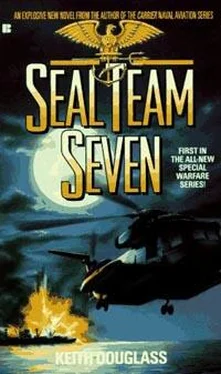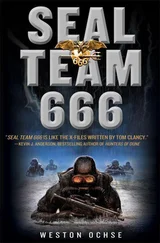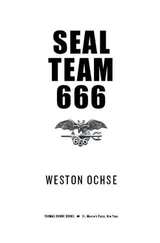Keith Douglass - Seal Team Seven
Здесь есть возможность читать онлайн «Keith Douglass - Seal Team Seven» весь текст электронной книги совершенно бесплатно (целиком полную версию без сокращений). В некоторых случаях можно слушать аудио, скачать через торрент в формате fb2 и присутствует краткое содержание. Жанр: Боевик, на английском языке. Описание произведения, (предисловие) а так же отзывы посетителей доступны на портале библиотеки ЛибКат.
- Название:Seal Team Seven
- Автор:
- Жанр:
- Год:неизвестен
- ISBN:нет данных
- Рейтинг книги:3 / 5. Голосов: 1
-
Избранное:Добавить в избранное
- Отзывы:
-
Ваша оценка:
- 60
- 1
- 2
- 3
- 4
- 5
Seal Team Seven: краткое содержание, описание и аннотация
Предлагаем к чтению аннотацию, описание, краткое содержание или предисловие (зависит от того, что написал сам автор книги «Seal Team Seven»). Если вы не нашли необходимую информацию о книге — напишите в комментариях, мы постараемся отыскать её.
Their cargo includes two tons of weapons-grade plutonium. And now, with enough nuke fuel to arm a superpower, an alliance of fanatics threatens to poison a continent.
In a daring mission of high-seas heroism, Lt. Blake Murdock leads his seven-man unit from Team Seven's Red Squad into bulkhead-to-bulkhead battle — with high-tech
buccaneers who've got nothing left to lose...
Seal Team Seven — читать онлайн бесплатно полную книгу (весь текст) целиком
Ниже представлен текст книги, разбитый по страницам. Система сохранения места последней прочитанной страницы, позволяет с удобством читать онлайн бесплатно книгу «Seal Team Seven», без необходимости каждый раз заново искать на чём Вы остановились. Поставьте закладку, и сможете в любой момент перейти на страницу, на которой закончили чтение.
Интервал:
Закладка:
"I, for one, resent the implication that my people are show-boating a mission," Coburn said evenly. "These men are pros, Admiral. There are no 'hot dogs' in my command."
"Perhaps that was too strong a word, Captain," Kerrigan said. "But how are we supposed to coordinate a plan that your men keep changing in the field?"
Coburn grinned. "Are you suggesting, Sir, that one lieutenant in a sailboat is about to upset something as big as Operation Deadly Weapon?"
"At this point, Captain, I'm not sure there's anything your people can't do... or screw up if they put half a mind to it." He said it with a wry half smile, and the other officers in the briefing room laughed.
Coburn felt himself relax a little. He'd been expecting a far bloodier battle with the MIDEASTFOR liaison, but Kerrigan's constant opposition to NAVSPECWAR operations appeared to have eased somewhat since the last time he'd been in this room. Obviously he still didn't like the special forces concept, but he at least was willing to work with the idea and had agreed that Deadly Weapon would lead off with NAVSPECWAR people. He seemed most concerned now with the possibility that intelligence data routed back from Murdock's team might force a last-second change in the U.S. Marine amphibious operations about to commence in the Gulf.
Today's planning session had actually been called by Brian Hadley, who was scheduled to meet with the President's National Security Advisor later that evening. He'd wanted an assessment by members of the Navy Special Warfare community about whether or not the idea radioed back by Murdock had a chance of working.
Except for Kerrigan and his people, of course, everyone in the room had thought Murdock's plan a wizard idea. And Kerrigan's opinion carried little weight here. Everyone knew he was down on the special-ops people, and he was consulted on the matter only because Deadly Weapon would fall under MIDEASTFOR's provenance.
But the SEALs were going to be a part of this, no matter what Kerrigan had to say.
"I suppose what I object to most," Kerrigan went on, "is this sense of making things up as we go along. Modern war can't be fought that way."
"On the contrary, Admiral," Hadley said. "Vietnam demanded flexible, adaptive battle plans, and every military option since has demonstrated the need for more flexibility, not less. We've got to know what we're getting into over there."
"I would have thought that the SEAL-Marine joint recon force was adequate to our needs."
"Maybe so," Coburn said. "I damn well hope you're right. But it seems to me that young Murdock is going to be the right man in the right place at the right time, and we'd be fools to yank him out now. This is too good an opportunity to throw away."
A rippling murmur of approval made its way about the table. Coburn had been as surprised as anyone else in Little Creek by Murdock's radio message, some eighteen hours ago, suggesting this last-minute change to Deadly Weapon. The former hostages, the Iranian prisoner, and all of the SEALs save four had been ferried by helicopter back to the Nassau.
But as of the last report, Murdock and three of his men were still aboard the Beluga, sailing in company with the Iranian squadron toward the port of Bandar Abbas.
It was expected that they would actually enter Bandar Abbas in another — he looked at his watch — eighteen hours now. Just hours ahead of the planned Marine invasion of Iran.
"But how reliable is Murdock's information, do you think?" a captain on Kerrigan's staff wanted to know as the murmur died down. "His report says he got all of this from that captured Iranian colonel. Couldn't all of this be some kind of elaborate setup?"
"Up at Langley," Hadley said, "they're rating this one as a B-3."
"What's that supposed to mean?"
"It's how the CIA weights the reliability of data acquired from various sources. The letter gauges the reliability of the source, while the number reflects Langley's guess as to how accurate the information might be. B means usually reliable. That's not a put-down of your man, Captain Coburn. I don't think anyone ever gets tagged with an A, meaning absolute reliability. The 3 means the information is possibly accurate. It's not confirmed by other sources, so it's not a 1, and it's not possible to call something this fuzzy probably true, so we can't give it a 2. The point, gentlemen, is that we have here a reliable source giving us intelligence that quite possibly is accurate. We cannot afford to simply ignore what he says."
"Has anyone thought to consult with Congressman Murdock about this?" Kerrigan asked. "That's his son out there. I find it shocking that he was allowed to lead two dangerous assaults one right after the other, first against the Yuduki Maru, and then against the Beluga, and that now he's doing this."
"Lieutenant Murdock," Coburn said slowly, "is an excellent officer. He does not allow politics, personal feelings, or shall we say, family obligations to divert him from what he perceives as his duty. I am well aware of Congressman Murdock's interest in his son's activities. I'm also aware that neither Lieutenant Murdock, nor myself, nor the President of the United States himself for that matter, can allow personal feelings to jeopardize this operation. I'm sure, sir, that the congressman would be the first to agree if he were here."
"So what you're all telling me," Brian Hadley said at last, "is that this sneak-and-peek is a good idea. That we should plan this thing knowing we're going to have SEALs on the ground, or on the water actually, when we send in the Marines."
"Abso-damn-lutely," Coburn said. "These people'll be able to tell you things your spy satellites never dreamed of."
Hadley grinned. "I hope so, Captain. Because I happen to agree with you. This is too God-damned good an opportunity to throw away!" He began gathering up the charts and papers on the table in front of him and putting them into his briefcase. The naval officers rose, began gathering up their own papers, and started to leave.
"Captain Coburn?" Hadley said, looking up.
"Sir?"
"I wonder if I might have a word with you before you go?"
"Of course, sir," Coburn said. He glanced again at his watch. "I am on a pretty tight sched."
"I understand you're on your way over there."
"Yes, sir. First and Second Platoons will be taking part in the main landings."
"I just wanted to hear it from you, your assessment of young Murdock. He's been pushing pretty hard. Can we push him this much more?"
Coburn considered the question. "If he wasn't up to it, Mr. Hadley, I don't think he would have suggested it. Murdock always has the Team's best interests at heart, not his own."
"Hmm. That was my assessment, based on what I've heard. You know, don't you, that a lot of the SEALs' future is riding on this op?"
Coburn grinned at him. "Tell me something I don't know."
"Right now, a House investigative committee is going over your Murdock's after-action report on the Japanese freighter. They're explaining to each other how they could have done it better, and they're wondering if all the money they're giving NAVSPECWAR is being well spent. There's serious talk of disbanding the SEALS, Marine Recon, the Rangers, all of the SPECWAR people except the Green Beanies."
"Give us half a chance, Mr. Hadley. We'll show them that we can deliver plenty of bang for the buck."
"Yes. From what I've heard about your people, I have to agree." There was a knock at the door, and Coburn looked up. A young second class electrician's mate stood there, his SEAL Budweiser winking brightly in the overhead fluorescent lighting. "Hey, Chucker! Come on in."
"Helo's waitin'on the pad and ready to go, sir," EM2 Wilson called, gesturing with the rolled-up white hat in his hand. "Whenever you're ready."
Читать дальшеИнтервал:
Закладка:
Похожие книги на «Seal Team Seven»
Представляем Вашему вниманию похожие книги на «Seal Team Seven» списком для выбора. Мы отобрали схожую по названию и смыслу литературу в надежде предоставить читателям больше вариантов отыскать новые, интересные, ещё непрочитанные произведения.
Обсуждение, отзывы о книге «Seal Team Seven» и просто собственные мнения читателей. Оставьте ваши комментарии, напишите, что Вы думаете о произведении, его смысле или главных героях. Укажите что конкретно понравилось, а что нет, и почему Вы так считаете.












